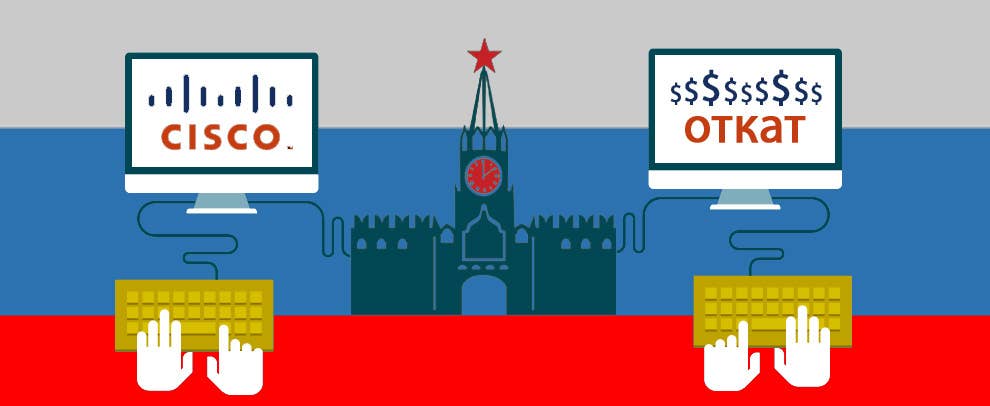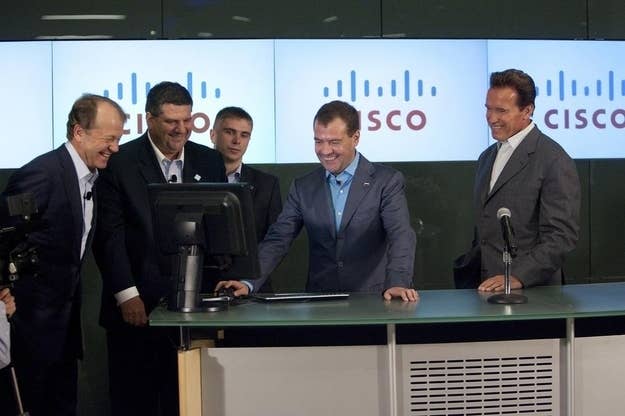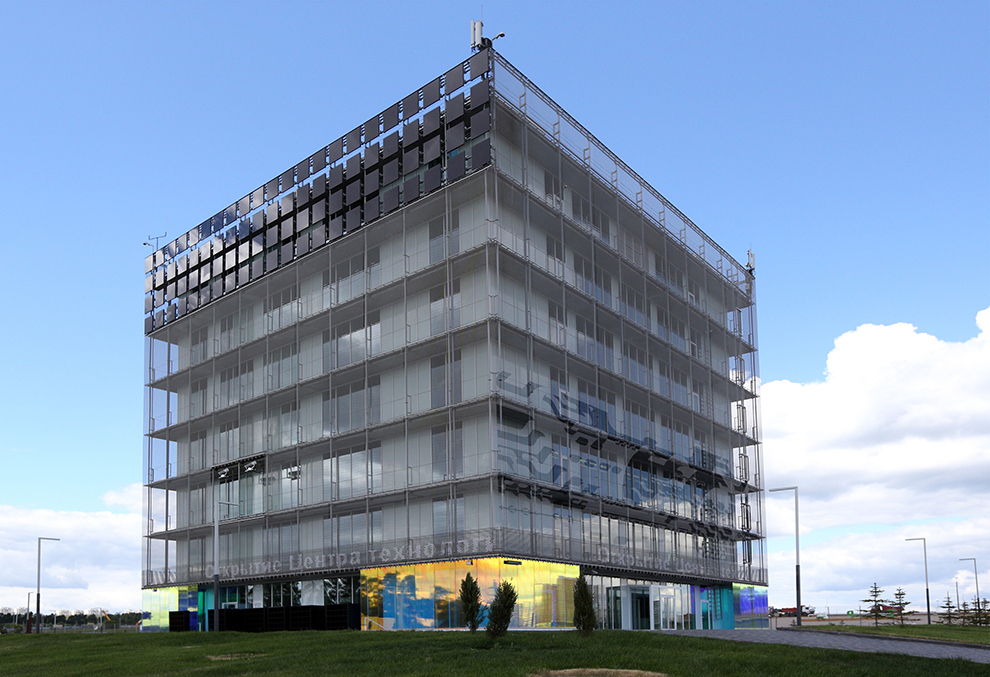
One day in 2010 a team of Westerners arrived at the Krylatsky Hills industrial park in Moscow, near the old 1980 Olympic bicycle track. It’s a gleaming set of five-story glass and stone buildings, with a modern parking lot that goes on forever. The men headed upstairs, where anxious Russian workers waited in their cubicles because they’d heard that these were former American and British intelligence and law enforcement officials, experts in interrogation. And the men carried themselves with a recognizable sense of authority, that same confidence ex-KGB men had.
But these were not intelligence officials. Instead, according to two people familiar with the matter, they were compliance investigators working on assignment for the headquarters of American technology giant Cisco. The company was auditing itself and the investigators were the corporate version of an internal affairs squad: Were Cisco executives bribing corrupt Russian officials? Was that the secret to the company’s booming business in the region?
The men sat one Russian Cisco executive down in a conference room and shut the door. One investigator opened a dossier and they began asking rapid-fire questions, according to someone who was in the room. Was Cisco paying bribes in Russia? Was money being diverted to government officials?
The Russian Cisco executive just shrugged. In heavily accented English he told the Westerners, “Everyone in Russia takes money and pays money. You can’t have business in Russia without that.” But he knew nothing specific, he insisted.
“It’s like sex,” he told the interviewers. “I know that you have sex. But with whom? How often? In what position? This I don’t know.”
Now, four years later, the iconic American firm is facing a federal investigation for possible bribery violations on a massive scale in Russia. At the heart of the probe by the Department of Justice and the Securities and Exchange Commission, sources tell BuzzFeed, are allegations that for years Cisco, after selling billions of dollars worth of routers, communications equipment, and networks to Russian companies and government entities, routed what may have amounted to tens of millions of dollars to offshore havens including Cyprus, Tortola, and Bermuda.
Cisco disclosed the federal probe in a February SEC filing. The company says it takes the allegations seriously and has hired the white-shoe law firm WilmerHale to conduct an internal investigation that the federal government requested. Cisco declined to comment further.
Attorneys at WilmerHale did not return phone calls seeking comment. The SEC and the Department of Justice also would not discuss the case.
Until now, details of how Cisco allegedly paid bribes in Russia have not been reported. But two former Cisco insiders have described to BuzzFeed what they say was an elaborate kickback scheme that used intermediary companies and went on until 2011. And, they said, Cisco employees deliberately looked the other way.
The case is important not only for one of American’s most prestigious and innovative technology companies, valued at $110 billion. It comes just as the dispute over Ukraine puts the United States and Russia in their gravest military and diplomatic face-off in decades — and as the U.S. tries to strike financially at Russian President Vladimir Putin and the country’s oligarchs. If the allegations against Cisco are true, they would implicate a major American corporation in the corrupt system that the U.S. is now trying to sanction, the system that props up Putin and the confidants he has installed in key Russian ministries and companies.

Cisco entered the Russian market in 1995. In 2007, a top Cisco official told Businessweek that “as we look globally to where the next venture asset class is going to emerge, it is definitely Russia and Central and Eastern Europe.”
The company does not usually make public its sales in Russia, and it declined to provide those figures to BuzzFeed. It says that Russia and some other former Soviet countries make up less then 2% of its revenue, and 2% adds up to a little under $1 billion. But growth seems to have been phenomenal. From 2010 to 2011, sales in Russia rose 63%, according to one rare public revelation in an SEC filing.
In 2010 Russian’s then-President Dimitry Medvedev paid a visit to Cisco’s sprawling San Jose, Calif., headquarters — a virtual town unto itself. During Medvedev’s visit, Cisco CEO John T. Chambers announced that the firm was investing $1 billion in a pet project of Medvedev, a high-tech innovation center that was envisioned as a “Russian Silicon Valley.”
No one is suggesting that Cisco bribed Russia's top leaders. Instead, the investigation is centered on day-to-day kickbacks to officials who ran or helped run major state agencies or companies. Such kickbacks, according to the allegations, enabled the firm to dominate Russia’s market for IT infrastructure.
The Russian word for kickback is otkat, which translates directly into “roll back” — as in a ball rolling back down a hill. It has been part of Russian culture for generations. Revolutionary poet Vladimir Mayakovsky penned a satirical “Hymn to the Bribe” in 1915, and the writer Erast Pertsoff authored a book in 1830 called the Art of Bribe Taking, in which he called bribes “the road to happiness.”
Otkat is now endemic in Russia, which is listed as one of the most corrupt countries in the world by Transparency International. Indeed, Vladimir Putin’s own campaign chief in 2012 announced, "Today we have returned to 'normal,' 'civilized' corruption.” (He was trying to emphasize an improvement over the outright thievery of the 1990s.)
But U.S. law bans American companies and citizens from paying off foreign officials to get business. Under the Foreign Corrupt Practices Act, or FCPA, violators can be punished with prison sentences of five years for each bribery count. And even more serious are the penalties for doctoring records to conceal bribes — up to 20 years.
Last year, according to sources close to the investigation, a whistleblower came forward to the SEC, sketching out a vast otkat scheme and providing documents as evidence. In some FCPA cases, whistleblowers are eligible to receive 10 to 30% of fines that companies pay to the government.
Like other companies in technology and software, Cisco often markets its products through a system of resellers and distributors — middlemen. So in Russia, Cisco didn’t sell directly to the Russian government or companies. In its SEC filing disclosing the federal investigation, Cisco stated that the allegations involved “certain resellers of the Company's products.”
Indeed, it’s in the system of middlemen where kickbacks flourished, according to two former Cisco sales executives who spoke to BuzzFeed. One of the former Cisco employees explained it like this: In the 1990s in Russia, bribery was often simple. “People would bring bags of cash to people’s offices.” But Cisco, he said, “introduced a new way of giving bribes. They were innovative. This system with the resellers and the rebates offered an opportunity of giving money without getting your hands dirty, so you could get money to offshore accounts.” It's not clear when the alleged scheme started up, but the former executives said it went on for years until 2011, when it stopped.
A kickback usually means giving money back to officials in exchange for steering business your way. And it’s usually complicated, with the money getting passed through different hands to disguise what’s really happening.
The two former Cisco executives laid out for BuzzFeed how the alleged scheme worked:
In Cisco’s Russia operations, funds for kickbacks were built into the large discounts Cisco gave certain middleman distributors that were well-connected in Russia. The size of the discounts are head-turning, usually 35% to 40%, but sometimes as high as 68% percent off the list price.
And there was a catch: Instead of discounting equipment in the normal way, by lowering the price, parts of the discounts were often structured as rebates: Cisco sent money back to the middlemen after a sale. Some intermediaries were so close to the Russian companies and government agencies — Cisco’s end customers — that these intermediaries functioned as their agents.
These middleman companies would direct the rebate money to be sent to bank accounts in offshore havens such as Cyprus, the British Virgin Islands, or Bermuda.
The former Cisco employees said they do not know who owns or controls those offshore accounts — in other words, who ultimately received the rebates. But they said the rebates were actually kickbacks. As one of them put it, “The main logic behind the rebates was to make sure they were able to stimulate, materially stimulate, the officials” who worked for the government entities.
In Russia, Cisco had at least 18 major middleman distributors that it calls “partners,” of which BuzzFeed was able to find contact information for 15. One official of a Cisco distributor called Marvel, Denis Golotcha, laughed and was dismissive of these allegations when reached by BuzzFeed by phone in late March. “I think it is a good first of April joke,” he said. “But it is a little early.”
“I cannot confirm any information about rebates,” he added. He asked for questions in an email, but did not respond to the email. None of the other companies responded to requests for comment.

There are indications that Cisco received some warnings about its Russian operations. In 2008, for example, according to a draft report marked “CISCO HIGHLY CONFIDENTIAL – CONTROLLED ACCESS” and obtained by BuzzFeed, outside auditors specifically listed a “high” legal risk for Cisco, because of “transactions with entities in ‘tax haven’ countries.” The draft, which a source said was delivered to Cisco, lists one Russian Cisco reseller based in Cyprus and another located in Tortola, the British Virgin Islands.
The Department of Justice has drawn up guidelines to explain the FCPA law so that companies don’t violate it. The guidelines specify signs to watch out for, including “unreasonably large discounts to third-party distributors” and cases in which the intermediary “requests payment to offshore bank accounts”
Jessica Tillipman teaches corruption law at George Washington University and is the senior editor of The FCPA Blog. Told of the allegations about Cisco, she said, “It’s full of red flags. It’s got the typical factors you see in FCPA cases: big rebates, offshore payments, government agencies.”
Still, a major challenge for investigators might be connecting the offshore accounts to Russian officials — in other words, determining if the rebates were actually kickbacks.
One of the former Cisco officials said that he and other employees studiously ignored where the money was going. When those issues came up during talks with middlemen and the government, he said, “I left the room. They said, ‘You can stay,’ and I said, ‘I don’t want to.’ Officially we didn’t participate in discussions about payback, otkat.”
The Justice Department, in its 130-page guidelines to the Foreign Corrupt Practices Act, says that the law is meant to punish not just those who know whether bribes are being paid, but also “those who purposefully avoid actual knowledge.” A former Justice Department official, told of the case, said, “The ostrich defense does not work.” The legal standard to prosecute is that “you need to be aware that there is a high probability that a bribe can be paid.”
The two former Cisco sales executives told BuzzFeed they know of at least one case in which Cisco officials participated directly in talks about kickbacks. And the Russian company Cisco was doing business with is one that is ultimately controlled by the powerful oligarch Vladimir Ivanovich Yakunin, who reportedly has had a dacha near Putin's. After the Crimea crisis broke, the 65-year-old Yakunin was sanctioned by the United States.
Yakunin is the longtime boss of Russian Railways, the national railroad conglomerate. It owns a subsidiary, Transtelecom, or TTK, which provides internet service across the country. The former Cisco executives said some Cisco officials met directly with TTK executives in 2010 at Cisco’s office, where they negotiated the size of the discount and the rebates.
While there was already one intermediary in the deal, TTK allegedly wanted another middleman company to step in, a company that it controlled.
One of the former Cisco employees told BuzzFeed that TTK “created a small company — as a reseller — and insisted that Cisco sign them as a partner. Cisco could sell through the small company. All the otkat, the payback, accumulated through this small company and all this profit accumulated in this small company. And this was a special scheme to send the profit outside of Russia.”
In an email statement to BuzzFeed, TTK spokeswoman Ekaterina Zaytseva wrote that the firm couldn’t comment because “we've never heard about this story around Cisco before you contacted us.” All contracting with TTK, she added, is “determined during the open bidding procedures,” as required by Russian law.
Over the last three years, much has changed for Cisco in Russia. In 2011, disgruntled Cisco officials in Russia addressed a letter, obtained by BuzzFeed, to Cisco CEO Chambers. In stilted English, it lays out the otkat allegations: Cisco paid rebates “to offshore companies belonging to owners of Distributors, System Integrators and other Partners working in Russia. We have information that these offshore accounts can be sued to facilitate ‘black money’ to corrupt government officials.”
Around that time, according to the former Cisco executives, the company halted its system of large-scale rebates to offshore accounts, though large discounts continued.
Reporter Aram Roston can be reached at aram.roston@buzzfeed.com.
